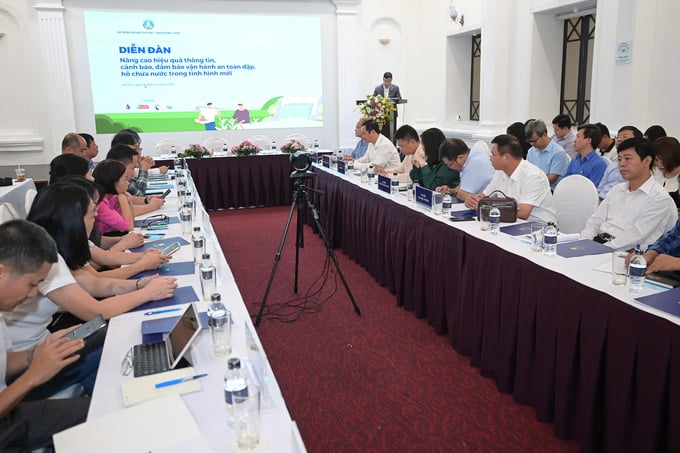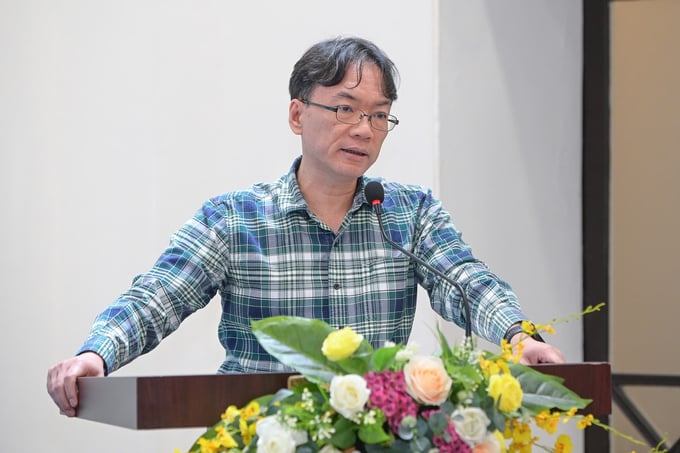May 31, 2025 | 05:49 GMT +7
May 31, 2025 | 05:49 GMT +7
Hotline: 0913.378.918
May 31, 2025 | 05:49 GMT +7
Hotline: 0913.378.918

On the morning of November 19, the forum "Enhancing the effectiveness of information, early warning systems and ensuring the safe operation of dams and water reservoirs in the new context" was held in Hanoi. Photo: Tung Dinh.
Given Vietnam's diverse terrain, stretching across 15 latitudes and encompassing multiple microclimates, meteorological and hydrological forecasting models require a considerable amount of time to reduce variance to below 5%.
To address this challenge and improve the management of irrigation reservoirs, there is a proposal to implement an intelligent operation system. Mr. Ha Ngoc Tuan, Deputy Director of KIV Company, shared insights into how Japanese technology is being used in real-time rainfall forecasting and water flow calculations for reservoirs. This technology allows for the proactive development of response strategies, enabling authorities to prepare ahead of floods more effectively.
At the forum, Mr. Tuan, representing the KIV-Weatherplus consortium, emphasized that it could take as long as 15 years to to collect and build sufficient input data to implement AI in meteorological and hydrological forecasting. Therefore, the use of digital technology and supporting systems in reservoir management is crucial. The company has fully adopted Japanese techniques and standards to enhance the precision of calculations and operations, with a focus on forecasting rainfall inflows to reservoirs and managing them effectively before floods occur.
Currently, around 40 large and small reservoirs are operating commercially and testing the Weatherplus management system. In the hydropower sector, the system has proven its effectiveness by improving economic returns, increasing income by 3-15% through water conservation. For the irrigation sector, initial trials have already shown promising results. For instance, at the Định Bình Reservoir in Binh Dinh, the system helped save 100 million cubic meters of water during the 2019 winter-spring crop season.
"In the wake of Typhoon No. 3, which directly impacted Vietnam and caused significant economic, social, and human losses, the reservoir operation support system (HNT) with Japanese technology proved effective in ensuring safe and efficient operations. This was particularly evident at three hydropower plants along the Ky Cung River system, one of the areas most affected by the heavy rainfall and flooding caused by Typhoon Yagi", said Dr. Ha Ngoc Tuan.
Mr. Ha Ngoc Tuan emphasized that to enhance the efficiency of reservoir management, it is not enough to focus solely on the lifespan of the reservoirs. It is equally important to integrate digital technologies, especially for tasks such as forecasting, flood management, and ensuring smooth and effective operation. The application of modern technology is essential for improving decision-making processes and increasing the resilience of reservoir systems in the face of changing environmental conditions.

The Deputy Director of KIV Company, representing the KIV-Weatherplus consortium, stated that the use of digital technology and supporting systems in reservoir management is a significant step forward. Photo: Tung Dinh.
The HNT system plays a vital role in optimizing the use of water resources, being an essential tool for flood regulation, minimizing water discharge, and enhancing the overall efficiency of both irrigation and hydropower projects. By enabling the operation of high water columns to reduce waste and ensuring safe flood management, the system integrates advanced digital technologies into its management processes. This integration results in significant improvements in terms of safety, operational efficiency, and cost-effectiveness.
Moreover, the forecasting and operational capabilities of the HNT system provide critical support for managers, enabling them to coordinate and make timely decisions during emergency situations or periods of extreme climate change. The system's ability to accurately predict water flow and manage reservoir levels ensures that the stability of reservoirs is maintained. This, in turn, helps protect the safety of local communities and safeguard the ecosystems surrounding the reservoirs.
"The HNT system is not only focused on developing and implementing disaster response scenarios but is also capable of providing highly accurate forecasting models for various natural events such as floods, droughts and other climate-related fluctuations.
Through the integration of advanced digital technologies, HNT significantly enhances the ability to respond quickly and efficiently to emergency situations. Moreover, it plays a crucial role in strengthening the long-term resilience of water management systems, helping to adapt to the challenges posed by climate change. This ensures the sustainable protection and use of water resources", said Mr. Ha Ngoc Tuan.
Furthermore, Mr. Tuan highlighted the importance of strong cooperation between the government and the private sector to ensure the successful development and long-term sustainability of the HNT systems. This collaboration is not only vital for constructing the necessary infrastructure and establishing effective management policies, but also for creating the conditions to rapidly collect and compile the most comprehensive forecasting data. By fostering this partnership, Vietnam can quickly deploy the HNT system, which will allow for more efficient management and regulation of water resources. In doing so, it will also significantly reduce the risks associated with natural disasters and the impacts of climate change, ultimately contributing to more resilient and sustainable water resource management.
Translated by Phuong Linh

(VAN) Vaccinating juvenile pangasius helps reduce disease, antibiotic use, and farming costs, increasing profits for export-oriented farmers in An Giang.

(VAN) Due to a limited supply of workforce and competitive recruitment requirements, businesses struggle to retain talented veterinary human resources.

(VAN) WOAH’s guidance aims to mitigate disease risks through a One Health approach that balances economic, conservation, and public health interests.

(VAN) Ms. Nguyen Thi Dung, Deputy Director of Ngoc Hoang Cooperative, shared about the journey of bringing dragon fruit to Europe, achieving annual revenues in the billions of VND.

(VAN) Bamboo products from Thang Tho Bamboo Cooperative have reached many countries around the world, while also creating jobs for local workers.

(VAN) The Management Board of Con Dao National Park reported that a green sea turtle, tagged in the Philippines, has traveled thousands of kilometers to lay 84 eggs on Bay Canh Islet.

(VAN) Green technology is paving a new path for sustainable aquaculture in the Mekong Delta in particular and across the country in general, helping reduce emissions and adapt to climate change.